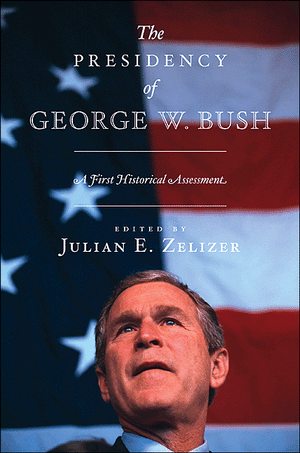Here's my abstract, and then I'll follow with more book info:
The Bush administration has been criticized for departures from the rule of law, but within the administration law was not ignored. Instead it was seen variously as a tool and as a potential threat to the operation of the executive branch. Two narratives compete for attention. In an era when the legality of torture was openly debated, the deployment of law in wartime seemed the most immediate issue. At the same time, however, a decades-long conservative movement to change American law was both significantly furthered and complicated, as Supreme Court appointments moved the Court to the right, but the lack of a common jurisprudence hampered the consolidation of a new conservative constitutional vision. More conservative courts might seem a safe haven for the president, less likely to challenge executive branch actions, but the Bush administration had a complicated relationship with courts. The administration sought out the courts to further aspects of a social policy agenda, such as restricting abortion rights and gun control. But when it came to challenges to the executive branch itself, the Administration used creative means to avoid court jurisdiction, including constitutional theories about executive power. Law was both a sword and a shield: it was a tool used to further some conservative objectives, and it was a shield intended to protect executive autonomy.Here are the book description and blurbs for The Presidency of George W. Bush:
The Presidency of George W. Bush brings together some of today's top American historians to offer the first in-depth look at one of the most controversial U.S. presidencies. Emotions surrounding the Bush presidency continue to run high--conservatives steadfastly defend its achievements, liberals call it a disgrace. This book examines the successes as well as the failures, covering every major aspect of Bush's two terms in office. It puts issues in broad historical context to reveal the forces that shaped and constrained Bush's presidency--and the ways his presidency reshaped the nation.
The Presidency of George W. Bush features contributions by Mary L. Dudziak, Gary Gerstle, David Greenberg, Meg Jacobs, Michael Kazin, Kevin M. Kruse, Nelson Lichtenstein, Fredrik Logevall, Timothy Naftali, James T. Patterson, and the book's editor, Julian E. Zelizer. Each chapter tackles some important aspect of Bush's administration--such as presidential power, law, the war on terror, the Iraq invasion, economic policy, and religion--and helps readers understand why Bush made the decisions he did. Taking readers behind the headlines of momentous events, the contributors show how the quandaries of the Bush presidency were essentially those of conservatism itself, which was confronted by the hard realities of governance. They demonstrate how in fact Bush frequently disappointed the Right, and how Barack Obama's 2008 election victory cast the very tenets of conservatism in doubt.
History will be the ultimate judge of Bush's legacy, and the assessment begins with this book.
Endorsements:
"An all-star cast of historians examines the perplexing presidency of George W. Bush--the 'compassionate conservative' who frequently ended up allied with the hard right, the 'uniter' who presided over one of the nation's most divisive political eras, the advocate of 'humility' on the world stage who fiercely championed unilateral presidential powers. After the journalists and pundits have had their say, the historians are here to put Bush's tumultuous tenure in historical perspective. An essential resource for anyone seeking to understand contemporary American politics."--Jacob S. Hacker, coauthor of Winner-Take-All Politics and Off Center
"With clarity and precision, some of America's most prominent historians of politics, law, and international relations examine the controversial presidency of George W. Bush. Their assessments of Bush's administration are sober, rigorous, and eye-opening. Together these essays will provide a foundation for the next generation of scholarship on early twenty-first-century America."--Thomas J. Sugrue, author of Not Even Past: Barack Obama and the Burden of Race
"George W. Bush once stated that 'we'll all be dead' by the time history casts its judgment on his presidency. Instead, in this engaging and timely portrait of the Bush era, eleven leading scholars assess the 'war on terror,' the resurrection of the imperial presidency, the effects of tax cuts and corporate deregulation, and other foreign and domestic policies promoted by big-government conservatism. While acknowledging the administration's political accomplishments, the contributors to this volume emphasize the ultimate failures of the Bush presidency and the conservative movement's strategies of governance."--Matthew D. Lassiter, University of Michigan
The table of contents is here, and an excerpt here.
